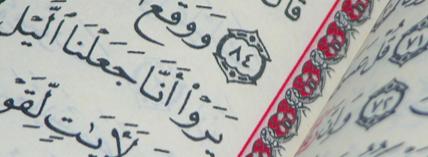The Qur’an vs the Bible
For the first time, Western Orientalists (primarily in Europe) are applying an external historical / critical analysis of the Qur’an, and the Islamic Traditions, and are offering a new and critical assessment of the nascent beginnings of Islam, which stands in direct contrast to the traditional story offered by most Muslim scholars today.
This material is particularly important in our discussions with the more radical wing of Islam, post 9/11, as it is they, more than any other Muslim group, who use the Qur’an and the traditions as their divine authority for the acts they do. But we won't stop there. We will also look at how this same analysis, when applied to the Bible, creates an authority for it that causes even the secular world to sit up and pay attention. This will include a direct comparison of the application of textual criticism methods to both the NT and Qur’an texts with the effect that textual variants have on the reliability of their texts.
PART 1: OVERVIEW The Bible vs. the Qur’an
1. Qur’an
1.1 Internal Critique
- ‘Inimitability’ Problems
- Uniqueness
- Superior literary Style
- Grammar
- Universal qualities
- Collation
- Contradictions
- Errors
1.2 External Critique
- Qur’an Canon
- Qur’an Manuscripts
- Scripts
- Coins
- Talmudic Sources
- Sectarian Sources
1.3 Qur’anic Authority for the Bible
- References
- Problem Passages
2. Bible
2.1 Documentary Evidence
- Ebla tablets
- Mari tablets
- Nuzi tablets
- Armana tablets
2.2 Archaeological Evidence
- 50 Old Testament people
- 27 New Testament people
2.3 Manuscript Evidence
- Canon
- Dating
- Extant Manuscripts
- Eyewitness Accounts
- Hostile Accounts
- Translations
- Lectionaries
- Early Church Father’s Letters
2.4 Luke’s accuracy
2.5 Archaeologists' Comments on the Bible
3. Missiological Implications
PART 2: TEXTUAL CRITICISM (Lower Criticism)
1. Textual Criticism of the Qur’an and the Bible: A Direct Comparison
A. Establishing a Critical Text: Understanding the process
B. Kinds of Variants Encountered
C. Effects of Variants
1) Qur’an variants: Orthography, Words and Phrases, and Suppression
2) New Testament Variants: Orthography, Words and Phrases, No Suppression
2. Textual Criticism of the Qur’an and the Bible: A True Comparison
A. Sorting Apples from Oranges
B. Double Standards and Objective Standards
3. Taking the Issues to Them
A. The Qur’an’s Problems as Scripture
B. The Bible’s Credentials as Scripture



